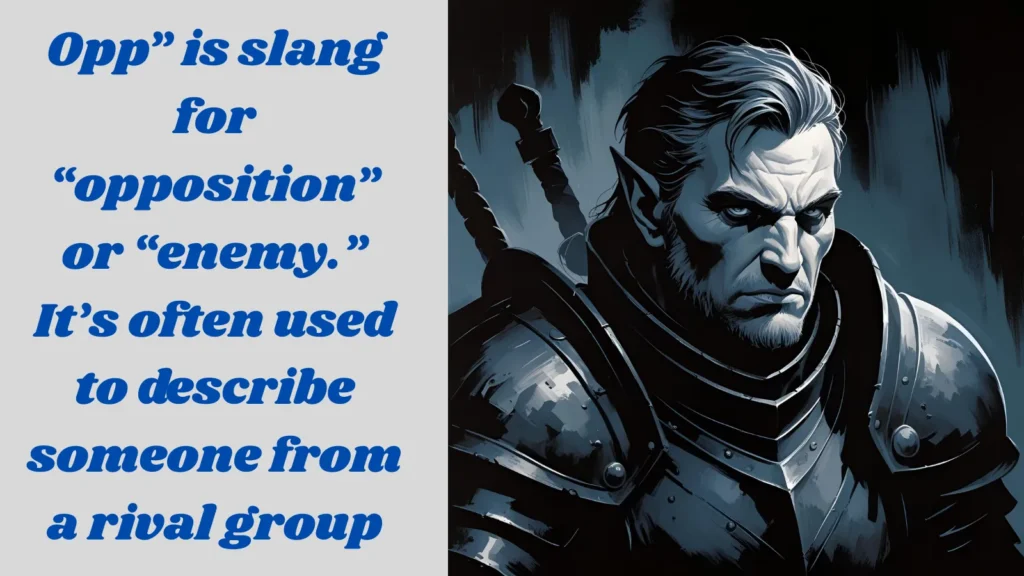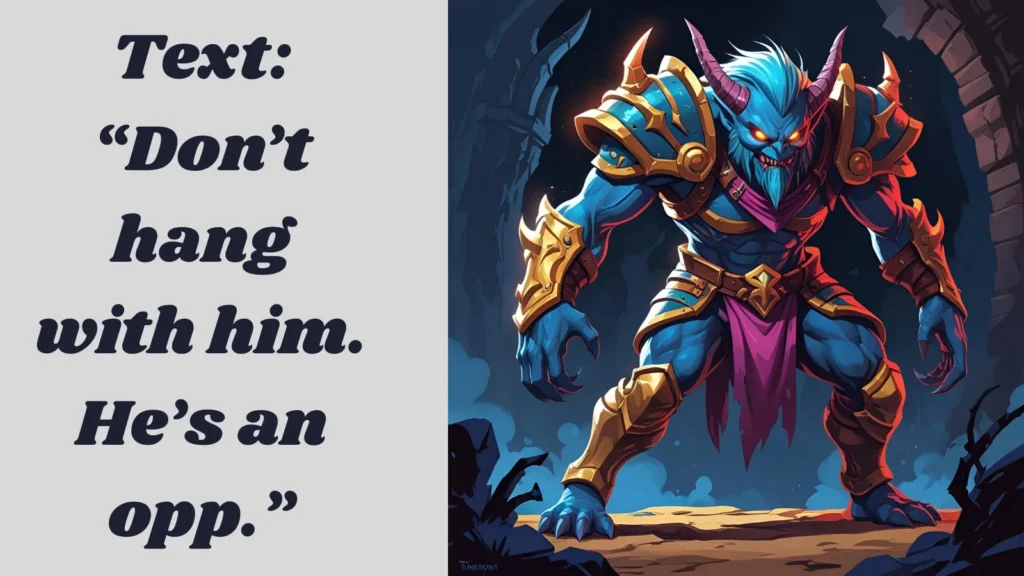Curious about the Opp meaning slang everyone’s using? Let’s decode this viral street term and its true message. Opp is a popular slang term that means “enemy,” “rival,” or “opposition,” especially in street culture and hip-hop. The word “opp” comes from opposition and is often used to describe someone from an opposing group or a person who can’t be trusted.
For example, you might hear someone say, “Watch out for the opps,” meaning “stay alert for rivals or enemies.”
In this article, we’ll break down the meaning of “opp” in slang, explore its origins in rap and street language, show how it’s used in real conversations, and share related slang terms so you can understand exactly what people mean when they say “opp.”
What Does “Opp” Mean in Slang?
In slang, “opp” means an enemy, rival, or someone who stands against you. The term comes from the word “opposition” and is widely used in hip-hop, street culture, and online conversations to describe a person from a competing group or a rival neighborhood.
When someone calls another person an “opp,” they’re labeling them as untrustworthy, disloyal, or part of an opposing side. It’s often used in the same way people say “rival” or “hater,” but with stronger, street-influenced connotations.
Example Sentences:
- “Don’t hang with them—they’re opps.”
- “He got caught chillin’ with the opps, and now everyone’s questioning his loyalty.”
- “In rap lyrics, ‘opp’ usually refers to enemies or rival crews.”

Key Points to Remember:
- “Opp” stands for opposition and means enemy or rival.
- Commonly used in hip-hop culture, street slang, and social media.
- The plural form “opps” refers to multiple rivals or enemies.
- Similar terms include “hater,” “rival,” and “enemy.”
Background and History
“Opp” is short for “opposition” or “opponent.” It first gained popularity in Chicago’s drill rap scene in the early 2010s. Rappers like Chief Keef and Lil Durk helped push it into mainstream hip-hop.
Over time, the word spread through:
- Music
- Social media
- Street culture
- Gaming communities
Originally, “opp” was used to describe a rival gang member or someone viewed as a threat. But as rap became more mainstream, so did the slang.
Timeline:
- 2010s: Chicago drill scene → gang-related term.
- 2015–2018: Featured heavily in rap lyrics.
- 2020s: Mainstream slang used in texting, TikTok, Instagram, and gaming.
Today, the context matters more than ever. “Opp” could mean a deadly rival or just someone you no longer vibe with.
Usage in Various Contexts
Let’s look at how “opp” shows up in daily life.
1. Texting
- “She’s talking to the opp again 🤦♂️”
- “I caught my ex texting the opp.”
2. Social Media
- TikTok caption: “When you run into your opp at the mall 💀”
- Twitter: “My teacher’s the real opp fr.”
3. Gaming
- “They’re camping with the opps!”
- “Let’s squad up. I don’t trust the opp.”

4. Real-Life Conversations
Maya: “You still cool with Tre?”
Dee: “Nah. He switched sides. Full opp behavior.”
Note: Even in jokes, it implies betrayal, rivalry, or hostility.
Common Misconceptions & Clarifications
Some people confuse “opp” with unrelated meanings. Let’s clear things up.
Does Opp mean someone you don’t like?
Not exactly. “Opp” specifically means someone working against you.
Is it a fun, harmless term?
Sometimes. But in gang culture or serious conflict, calling someone an “opp” can provoke real violence.
Does Opp mean police?
True, in some street slang, opp meaning can talk about law enforcement or snitches.
Similar Terms & Alternatives
Let’s look at some related slang and how they compare.
| Term | Meaning | Example |
| Opp | Enemy / rival | “Don’t talk to my opp.” |
| Hater | Someone who dislikes you | “She’s just a hater.” |
| Snake | Betrayer / fake friend | “He acted cool then snaked me.” |
| Fake | Inauthentic person | “I cut her off. She’s fake.” |
| Fed | Enemy/rival | “The ops are watching.” |
These can sometimes overlap, but “opp” is stronger than “hater” or “fake.”
How to Respond to This Term
Your response depends on the tone and situation.
1. Casual / Playful
Friend: “You sided with the opp!”
You: “😂 I was just tryna win, bro!”
2. Funny
Text: “Don’t be the opp.”
Reply: “Only on Tuesdays 😎”
3. Professional
Avoid slang in serious settings. Use:
“Let’s stay objective,” or “Let’s keep it neutral.”
4. Privacy-Conscious
Don’t respond if it feels aggressive. Block or report the person.
Regional or Cultural Differences
“Opp” is most common in the U.S., especially in:
- Urban slang
- African American Vernacular English (AAVE)
- Rap culture
However, the term is now known globally thanks to:
- Hip-hop music
- TikTok & Instagram trends
- Gaming YouTubers
In the UK, “opp” is also popular among drill rappers and urban communities.
But in many non-English-speaking countries, the word may be unknown or misunderstood.
OPP Comparison with Similar Terms
Here’s a quick look:
| Word | Intent Level | Seriousness | Common Context |
| Opp | High | Medium–High | Street, rap, gaming |
| Hater | Medium | Low | Social media, school |
| Snake | High | Medium | Friend betrayal |
| Fake | Medium | Low | Social circles |
| Fed | N/A | High | Criminal/street context |
“Opp” is sharper and more confrontational than most slang terms.
Usage in Online Communities & Dating Apps
OPP On TikTok & Twitter:
- Memes: “POV: You see your opp at Starbucks ☕”
- Threads: “Unfollowed the opp. Peace restored.”
On Gaming Platforms (Fortnite, GTA, etc.):
- “He’s working with the opps!”
- “We got ambushed by the opp team.”
On Dating Apps:
Rare, but someone might say:
- “No opp energy pls 😤”
- “If you follow my ex, you’re the opp.”
Use it only if the context fits. Otherwise, it can confuse people.
Suitability for Professional Communication
No, “opp” is not suitable for professional settings.
Avoid in:
- Work emails
- Job interviews
- Academic papers
Instead, use
- “Opponent”
- “Adversary”
- “Rival”
- “Competition”
Hidden or Offensive Meanings
Is “opp” ever offensive?
Yes, in gang-affiliated or threatening ways.
Don’t use it if you’re unsure of the company or tone.
- In casual talk: Fine.
- In aggressive posts, it could sound threatening.
- In texts with friends: Usually okay.
Tone + audience = everything. Avoid overusing it just to sound trendy.
FAQs
Q1: What does OPP stand for?
A: Opp is short for “opposition” or “opponent,” often used in street slang or rap culture to refer to a rival, enemy, or someone from an opposing group. It can also be used more casually to describe anyone you’re against or not cool with.
Q2: Can I call my friend an OPP as a joke?
A: Yes, but be careful—while some friends might find it funny, others could take it the wrong way depending on the tone and setting.
Q3: Where did Opp originate?
A: The slang term “opp” originated in Chicago drill music and street culture, where it stands for “opposition” or “opponent.”
Q4: What’s the difference between an “opp” and a “hater”?
A: An “opp” is usually seen as a direct enemy or rival, often with real conflict involved, while a “hater” is someone who dislikes or criticizes you, often from a distance.
Opps are seen as threats; haters are more like background noise.
Q5: What does opp energy mean?
A: Opp energy” refers to someone acting shady, disloyal, or like an enemy, especially when they’re supposed to be on your side. It’s a way to call out fake behavior or negative vibes from someone close.
Conclusion
Whether Opp shows up in music, memes, or messages, understanding its meaning is necessary to keep up with modern talk, especially in online spaces or street-influenced slang. “Opp” isn’t just a trendy term—it often signals conflict, rivalry, or someone who’s clearly not on your side.
By learning the real meaning behind Opp, you avoid using it out of context and stay aware of the tone. From gaming chats to rap battles, knowing who’s an “opp” might help you steer clear of drama—or spot it before it starts.
As with many slang terms, meaning can shift depending on tone and setting. In some circles, Opp may even be used playfully, but it still carries a sense of tension or challenge underneath.

